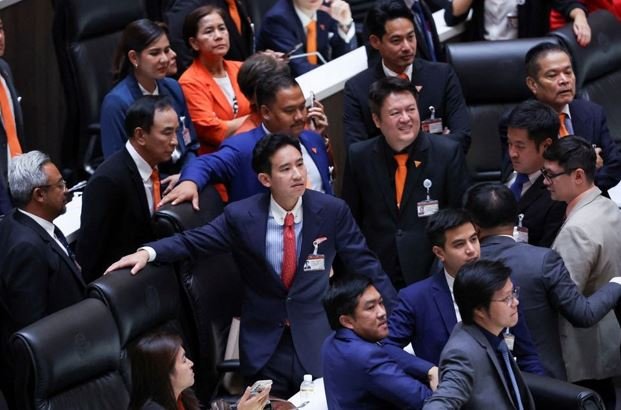On Wednesday, Thailand’s Constitutional Court opened the path for Parliament to proceed with the election of a new prime minister, which comes after over three months since the national elections. This was achieved by the court’s decision not to make a judgment on a complaint regarding the rejection of the leader of the party that emerged victorious.
The court had been asked with determining whether Parliament’s actions constituted a breach of the constitution due to their denial of the opportunity for the leader of the progressive Move Forward Party to be nominated once again as a candidate for the position of prime minister.
Pita Limjaroenrat’s Coalition: Constitution Hurdles
Party leader Pita Limjaroenrat had orchestrated an alliance of eight parties forming a legislative coalition with a commanding presence in the lower house of Parliament. However, in accordance with the constitution enforced by the military, a prospective new prime minister must secure majority support from both the elected House and the conservatively appointed Senate body established by a prior military administration.
You can also read: Parliament Snubs Pita Limjaroenrat’s Prime Ministerial Bid, Thai Politics Heats Up
In previous month, Pita encountered defeat in a parliamentary vote for the prime ministerial position. Numerous senators opposed his candidacy due to his party’s advocacy for reforming a law that criminalizes any criticism directed at Thailand’s royal family. Detractors argue that this law, which carries a potential sentence of up to 15 years in prison, has been misused as a political tool. Senate members, aligning themselves with traditional conservative royalist principles, view their role akin to protectors of these values, much like the military.
Subsequently, the joint Parliament declined to permit Pita’s re-nomination for a subsequent vote.
Pita Limjaroenrat left the parliamentary chamber after being suspended as an MP on July 19.
Pheu Thai Excludes Move Forward from Coalition, Citing Royal Defamation Law Reform
A group of lawmakers from Pita’s party and private individuals submitted a complaint to the state ombudsman, alleging that the action contravened the constitution. The ombudsman conveyed the grievance to the Constitutional Court, which, on Wednesday, dismissed the case, citing the absence of direct impact on the complainants due to Parliament’s decision. Consequently, the court deemed them ineligible to present the case before it.
Although the court’s verdict implied that Pita himself could potentially initiate a petition to seek a resolution on the matter, Move Forward’s spokesperson Rangsiman Rome clarified that Pita had no intention of pursuing this avenue. Rome reiterated that Move Forward maintains a strong belief in Parliament’s ability to re-propose a candidate for prime minister. Nonetheless, he emphasized that the dispute should be settled using the parliamentary processes rather than resorting to legal actions in court.
Following two unsuccessful attempts, Move Forward made way for its primary partner in the eight-party coalition, the Pheu Thai party, to undertake efforts in forming a new government.

Why is Pita restricted from performing Lawmaker Duties?
Pita experienced a defeat in the first parliamentary vote for Prime Minister, held last month. Numerous senators emitted votes against him due to his party’s advocacy to reform the law that prohibits any form of defamation against Thailand’s royal family.
The law, which could lead to imprisonment for as long as 15 years, has been wielded for political gains. Members of the Senate, similar to the military regard themselves as defenders of traditional conservative royalist principles.
Consequently, the joint Parliament decided to turn down Pita to be re-nominated for a second round of voting.
Also, Pita is facing charges due to his involvement in a defunct media company. The Thai constitution distinctly disallows lawmakers from owning a financial stake in media enterprises.
On his official Instagram account, Pita expressed his sentiment – “It’s apparent that relying solely on the people’s vote is not enough for governing the nation; senatorial endorsement is mandatory, and it probably won’t be adequate for the second PM nomination”.
After his suspension, Pita left the assembly hall in parliament, creating a scene that drew parallels to 2019, when Thanathorn Juangroongruangkit, leader of the Future Forward Party, was similarly suspended. A few months later, Future Forward was dissolved, only to be reestablished as Move Forward in 2020, led by Pita.
Pita successfully formed an alliance of eight parties supporting his candidacy for Prime Minister, securing a combined total of 312 seats in the House of Representatives. Still, his participation in the position of Prime Minister got blocked by a non-elected Senate. This decision was primarily driven by Move Forward’s firm commitment to pro-democracy ideals.
While Pita could still pursue the premiership, he had to give up their lower house parliamentary position and voting rights.
Soon after the Thai court’s decision, Thailand’s key SET stock index, experienced a sharp decline, followed by a marginal 0.09% increase compared to the previous day’s figures. If the prevailing climate of prolonged political uncertainty persists, it will lead to a bland market response and affect investor confidence.
Evaluating Military-Backed Party Participation
Many believe that in order to secure a House majority, the current coalition led by Pheu Thai must consider including one of the two military-backed parties that were resoundingly rejected in the elections. Pheu Thai has not dismissed the potential for this scenario.
Pheu Thai represents the latest addition to a series of parties associated with ex-Prime Minister Thaksin Shinawatra, a billionaire populist who was forced out in a 2006 military coup. Thaksin has expressed his intention to return to Thailand in the near future, having spent years in self-imposed exile to evade imprisonment in multiple criminal cases that he claims are politically motivated.
In response to the court’s ruling, House Speaker Wan Muhamad Noor Matha stated on Wednesday that he intends to schedule the next prime ministerial vote for Tuesday. He also revealed plans to convene with parliamentary leaders on Thursday to address this matter.


